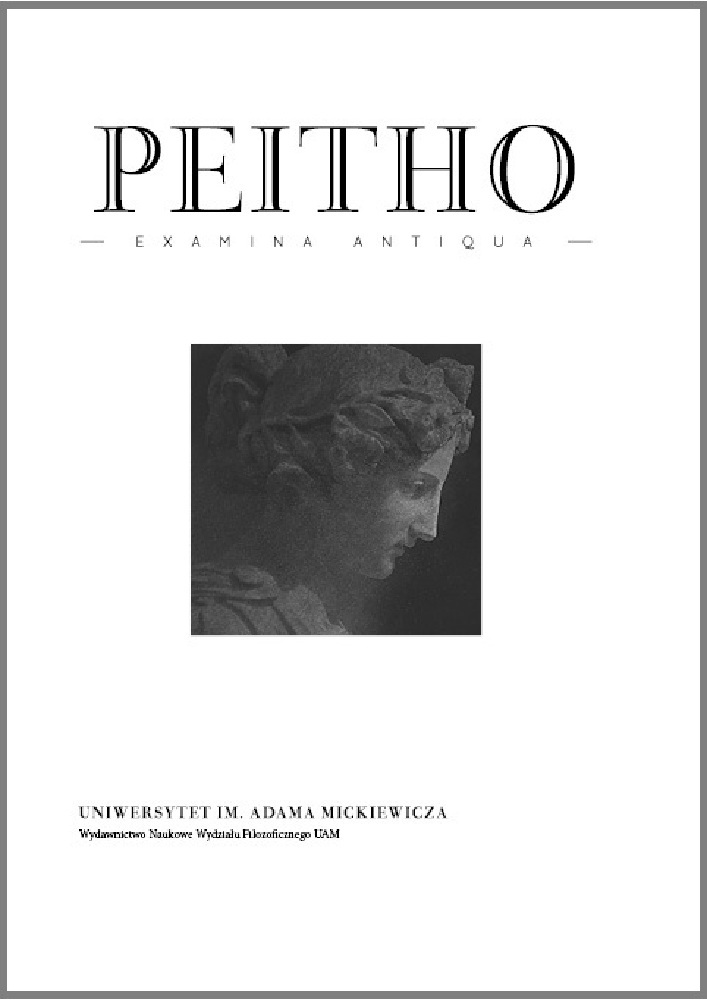Abstract
The Byzantine philosopher Michael Psellos (11th century) wrote a brief treatise entitled An Explanation of the Drive of the Soul Chariot and the Army of Gods According to Plato in the Phaedrus. The treatise consists of a compilation of excerpts from Hermias’ commentary on the Phaedrus. Psellos does not mention Hermias’ name but rather traces the origins of the treatise back to some “Greek theologians”. Psellos’ text presents a great interpretative challenge: the order of the myths about the charioteer and the parade of gods is reversed so that the former explicates the latter in such a way that the whole Platonic argument is dismissed as “absurd”. The Phaedrus in the Neo ‑Platonic tradition (in Iamblichus in particular) is considered to be a strictly theological dialogue. Yet, Psellos’ arrangement shows that he was not interested in the mythographical or allegorical dimension of the excerpts. He rather focused on the epistemic problem, i.e., a reduction of the trichotomy of the soul into a duality of principles. Thus, he followed certain Aristotelian commentators. Psellos suggests a reduction that is subjectivist or individualist in its nature and he refuses to identify individual intellect with any particular piety.
References
Arabatzis, G., 2000a, “Condensation and Process in the Prologue of Plato’s Phaedrus (229 c ‑ 230 a)”, Philosophical Inquiry 22/3, pp. 65—70.
Arabatzis, G., 2000b, “Qu’entend Michel Psellos par καταμαντευόμενος?”, Philosophia 30, pp. 114—117.
Arabatzis, G., 2003, “Enkalypsamenos. La piété socratique dans le Phèdre de Platon”, Kernos 16, pp. 119—123.
Arabatzis, G., 2006, “Gymnè Kephalè. Jean Damascène et le Phèdre de Platon”, in: E. Moutsopoulos et G. Lekkas (eds.), La transcendance dans la philosophie grecque tardive et dans la pensée chrétienne, Paris, pp. 60—271.
Arabatzis, G., 2009, “La noblesse des astres dans la philosophie byzantine”, in: G. Arabatzis (ed.), Studies on Supernaturalism, Berlin, pp. 137—156.
Bernard, H., 1997, Hermeias von Alexandrien, Kommentar zu Platons Phaidros, Tübingen.
Bielmeier, A., 1930, Die neuplatonische Phaidrosinterpretation: ihr Werdegang und ihre Eigenart, Paderborn.
Brisson, L., 2005, Introduction à la philosophie du mythe. 1. Sauver les mythes, Paris.
Collin, R. J., 1952, “Plato’s Use of the Word manteuomai”, CQ 2, pp. 93—96.
Dyson, M., 1982, “Zeus and Philosophy in the Myth of Plato’s Phaedrus”, CQ 32/2, pp. 307—311.
Festugière, A. J., 1971, “L’ordre de lecture des dialogues de Platon aux Ve/VIe siècles”, in: Du même, Études de philosophie grecque, Paris, pp. 535—550.
Jenkins, D., 2006, “Psellos’ Conceptual Precision”, in: Ch. Barber et D. Jenkins (eds.), Reading Michael Psellos, Leiden‑Boston, pp. 131—151.
Merlan, P., 1968, From Platonism to Neoplatonism, Hague.
Moreschini, C., 1992, “Elementi dell’esegesi del Fedro nella tarda antichità”, in: L. Rosetti (ed.), Understanding the Phaedrus. Proceedings of the II Symposium Platonicum, St. Augustin, pp. 191—205.
Praechter, K., 1913, “Hermeias aus Alexandreia”, RE 8.1, pp. 733—734.
Romilly, J. de, 1979, La douceur dans la pensée grecque, Paris.
Zervos, C., 1920, Un philosophe néoplatonicien du Xle siècle: Michel Psellos, Paris.
License
Peitho provides immediate open access to its content on the principle that making research freely available to the public supports a greater global exchange of knowledge.
